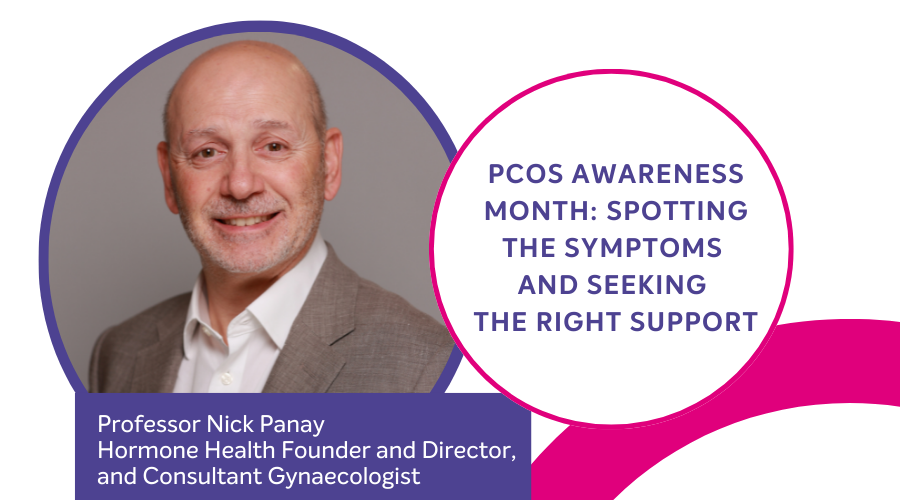PCOS Awareness Month: Spotting the Symptoms and Seeking the Right Support

September is Polycystic Ovary Syndrome (PCOS) Awareness Month, a time to shine light on a condition that affects more than 3 million UK women.
Despite its prevalence, many struggle for years before receiving a diagnosis, often feeling confused or dismissed. At Hormone Health, we believe awareness is the first step toward empowerment and better care.
What are polycystic ovaries?
Polycystic ovaries are slightly larger than normal ovaries and have a higher number of follicles, which release the eggs when a woman ovulates. Polycystic ovaries can be present without causing any symptoms.
What is PCOS?
PCOS is where there are hormonal and metabolic disturbances in addition to the presence of polycystic ovaries e.g. lack of/no periods, high androgens or an increased risk of obesity / diabetes / high blood pressure
What are the symptoms of PCOS?
PCOS can impact your periods, fertility, hormones and aspects of your appearance. It can also affect your long-term health.
PCOS affects woman in different ways, some may have only mild symptoms, while others may have a wider range of more severe symptoms i.e. it is a spectrum.
The common symptoms of PCOS include:
• Irregular periods, or no periods at all
• Hirsutism (an increase in facial or body hair)
• Loss of hair on your head
• Experiencing a rapid increase in weight or having difficulty losing weight
• Oily skin and acne
• Difficulty becoming pregnant
In some cases, PCOS can also cause depression and psychological problems.
How is PCOS diagnosed?
Diagnosing PCOS can be challenging, as its symptoms may overlap with other conditions. A diagnosis is typically considered when at least two of the following are present:
- Irregular or absent periods – infrequent menstrual cycles or no periods at all
- Signs of elevated androgens – such as excess facial or body hair, or blood tests showing higher-than-normal testosterone levels
- Polycystic ovaries on ultrasound – many small follicles visible on the ovaries
Once a diagnosis is made, the next step usually involves a referral to a gynaecologist or endocrinologist for further evaluation and management.
Long-term health risks of PCOS beyond fertility
While PCOS is often associated with infertility, it’s important to recognise that it can impact overall health.
Women with PCOS may be at higher risk of:
- Insulin resistance and type 2 diabetes (up to 20% of women with PCOS may go on to develop diabetes)
- High blood pressure
- High cholesterol
- Womb cancer (please note, PCOS does not increase the risk of breast or ovarian cancer)
- Sleep apnoea
- Anxiety and depression
In each case, careful monitoring of the symptoms should be conducted.
How to reduce the long-term health risks of PCOS
To lower the risk of diabetes, heart disease, and other complications:
- Follow a healthy balanced (Low Glycaemic Index) Mediterranean-type diet, including fruit and vegetables, wholemeal bread, whole-grain cereals, brown rice, lean meat, fish and chicken
- Reduce your intake of sugar, salt, caffeine and alcohol
- Have regular meals, especially breakfast
- Taking food supplements which reduce insulin resistance can help e.g. myoinositol
- Exercise regularly
Treatment for PCOS
Although there is no definitive cure for PCOS, a combination of medical treatments and lifestyle changes can help manage symptoms and reduce the potential health impacts of the condition.
Hormonal treatments may include specific contraceptive pills, targeted hormone therapy, or low-dose fertility medications to stimulate ovulation for women trying to conceive.
Non-hormonal approaches can involve dietary supplements and the diabetes medication metformin to help manage symptoms.
Due to the complexity of the condition, it is advisable to seek the guidance of a specialist gynaecologist.
At Hormone Health, we take a holistic approach to managing PCOS, combining evidence-based clinical care with practical lifestyle support. Our services are designed to help manage symptoms, improve overall health, and empower you on your journey. These include:
- Personalised consultations with our specialists to discuss your symptoms and create a tailored plan; this includes a dietician and nutritionist as well as clinicians
- Prescription management to address hormonal imbalances or fertility needs
- Scans and ultrasounds to monitor ovarian and uterine health
- Weight management programs to support long-term wellbeing
Hormone Health Founder and Director, Professor Nick Panay, is a highly experienced Consultant Gynaecologist, with a special interest in gynaecological endocrinology, Menopause and Menstrual Disorders, and has with more than 36 years’ medical experience.
Arrange a consultation with Professor Panay, or any of his expert team of Hormone Health Associates, who have all been trained by Professor Panay.